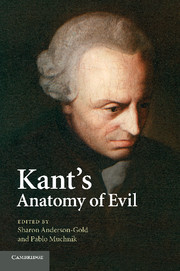Book contents
- Frontmatter
- Contents
- Contributors
- List of abbreviations
- Introduction
- 1 Kant's “Metaphysics of Permanent Rupture”: Radical Evil and the Unity of Reason
- 2 Kantian Moral Pessimism
- 3 Kant, the Bible, and the Recovery from Radical Evil
- 4 Kant's Moral Excluded Middle
- 5 Evil Everywhere: The Ordinariness of Kantian Radical Evil
- 6 An Alternative Proof of the Universal Propensity to Evil
- 7 Kant and the Intelligibility of Evil
- 8 Social Dimensions of Kant's Conception of Radical Evil
- 9 Kant, Radical Evil, and Crimes against Humanity
- 10 Unforgivable Sins? Revolution and Reconciliation in Kant
- Select bibliography
- Index
7 - Kant and the Intelligibility of Evil
Published online by Cambridge University Press: 04 May 2010
- Frontmatter
- Contents
- Contributors
- List of abbreviations
- Introduction
- 1 Kant's “Metaphysics of Permanent Rupture”: Radical Evil and the Unity of Reason
- 2 Kantian Moral Pessimism
- 3 Kant, the Bible, and the Recovery from Radical Evil
- 4 Kant's Moral Excluded Middle
- 5 Evil Everywhere: The Ordinariness of Kantian Radical Evil
- 6 An Alternative Proof of the Universal Propensity to Evil
- 7 Kant and the Intelligibility of Evil
- 8 Social Dimensions of Kant's Conception of Radical Evil
- 9 Kant, Radical Evil, and Crimes against Humanity
- 10 Unforgivable Sins? Revolution and Reconciliation in Kant
- Select bibliography
- Index
Summary
Kant's reasons for inquiring into the radical evil in human nature are very different from those that might now lead us to ask questions about evil. The aim of Religion within the Boundaries of Mere Reason was to explain to an audience of Christians (of eighteenth-century Lutherans) how their faith might be reconciled with a rational Enlightenment morality. Radical evil is the book's point of departure because of the religious importance of the Christian doctrine of sin. In Part One of the Religion, Kant's aim is to articulate that doctrine in rationalistic terms, so as to show in the other three parts how the Christian doctrines of justification and atonement, as well as the function of the church and revelation, might be articulated within the framework of a moral philosophy based on the autonomy of reason.
Today such aims make Kant far more enemies than friends. Christians, and religious people generally, typically charge him with “watering down” the faith, even with offering their religion a philosophical Trojan horse concealing within it the entire army of modern secular unbelief. On the other side, unsympathetic secular philosophers view the Religion as proof that Kantian ethics is at bottom nothing but traditional superstition. Both reactions seem to me utterly wrongheaded, but here I will not address either of them directly. Instead, my purpose will be to see how Kant's reflections on evil might speak to concerns that are more likely to interest us.
- Type
- Chapter
- Information
- Kant's Anatomy of Evil , pp. 144 - 172Publisher: Cambridge University PressPrint publication year: 2009
- 18
- Cited by

